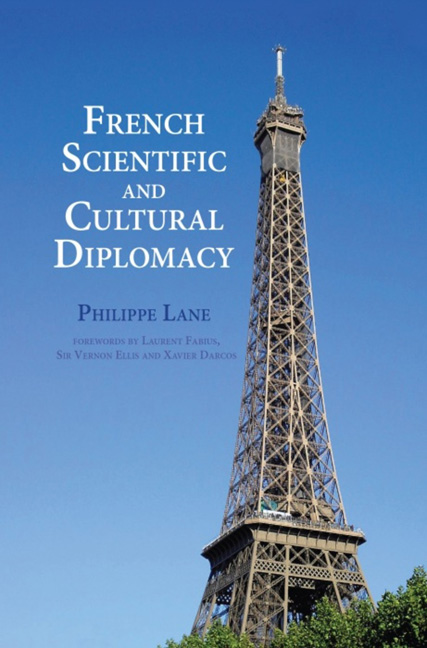Book contents
- Frontmatter
- Contents
- List of Tables
- List of Abbreviations
- Acknowledgements
- Foreword
- Foreword
- Foreword
- Introduction
- 1 French Foreign Cultural Activities: A Tradition with a Long History
- 2 Cultural and Scientific Action since 1995: Soft Power or Hard Power?
- 3 The Protagonists of Cultural and Scientific Diplomacy; 2011: A New Start
- 4 Cultural Diplomacy and the Arts
- 5 Science and University Diplomacy
- 6 Linguistic and Educational Cooperation
- 7 The Organization and Implementation of French Cultural and Scientific Activities Abroad
- Conclusion
- Index
2 - Cultural and Scientific Action since 1995: Soft Power or Hard Power?
- Frontmatter
- Contents
- List of Tables
- List of Abbreviations
- Acknowledgements
- Foreword
- Foreword
- Foreword
- Introduction
- 1 French Foreign Cultural Activities: A Tradition with a Long History
- 2 Cultural and Scientific Action since 1995: Soft Power or Hard Power?
- 3 The Protagonists of Cultural and Scientific Diplomacy; 2011: A New Start
- 4 Cultural Diplomacy and the Arts
- 5 Science and University Diplomacy
- 6 Linguistic and Educational Cooperation
- 7 The Organization and Implementation of French Cultural and Scientific Activities Abroad
- Conclusion
- Index
Summary
A New Paradigm?
Cultural and scientific diplomacy is currently topical. When Barack Obama was elected President of the United States in 2008, initial comments, followed by the primary political decisions (notably in the domain of scientific diplomacy) presaged the return of what is termed soft power, a peaceful means of influence, as opposed to hard power, a more coercive approach which can include use of military force. It was during 2008 and 2009 that the expression ‘diplomacy of influence’ appeared in France to characterize the country's cultural and scientific efforts abroad. This was what was required of Japan in its 1947 constitution, which obliged the country to give up armed intervention after the Second World War. Japan then embarked upon a significant programme to develop soft power – the ‘Japan cool’ – notably through comic strips, cartoons and other film and television successes.
From the French perspective, the question is whether the country is going to lose the battle of soft power? In his article, ‘Culture: pourquoi la France va perdre la bataille du “Soft Power”’, Frédéric Martel writes:
The cartography of cultural exchanges undergoes transformations. We witness a rise in power of global mainstream entertainment, mostly American, and the emergence of regional blocs. Furthermore, national cultures are everywhere strengthened, despite the ‘other’ reference, the ‘other’ culture being that of the United States. Last, there is an accelerating tendency to fuse influences: American entertainment is often produced by European, Japanese or, increasingly, Indian multinationals and at the same time local cultures are frequently produced by Hollywood. […] In this new landscape, Europe finds it very hard to find its place, and France is losing the battle of soft power.
Martel's diagnosis is harsh and certainly needs qualification. Nevertheless, according to this former cultural attaché to the United States, it still has several operational consequences.
The separation of the cultural from the diplomatic is seen as crucial in order to establish the independence of the cultural network. It is vital to assert the autonomy of research and to detach the debate of ideas from the diplomatic service as we enter the digital age. Art must be separated from the embassies, to allow professionals to concentrate on negotiating with the cable operators, with Internet access providers, television production companies, mobile telephone operators and media groups, instead of organizing art film showings and cultural suppers for ambassadors.
- Type
- Chapter
- Information
- French Scientific and Cultural Diplomacy , pp. 19 - 32Publisher: Liverpool University PressPrint publication year: 2013



